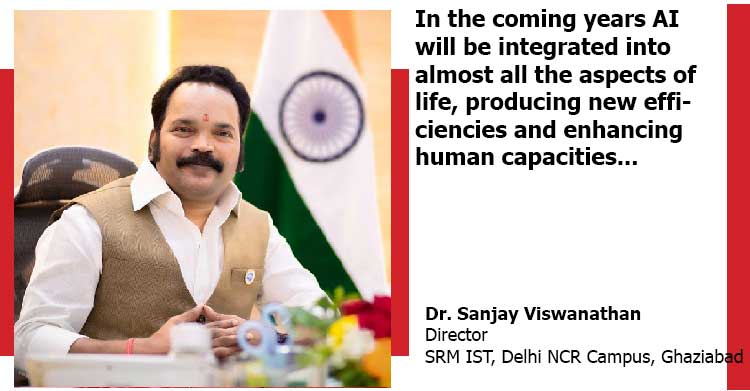An interview with Dr. Sanjay Viswanathan | Director-SRM IST | Delhi NCR Campus – Ghaziabad

Q1. SRMU, stands as one of the premier Institute in India. How far has SRMIST (SRM Institute of Science and Technology), Delhi NCR Campus, Ghaziabad (U.P.) grown as a center of excellence in different aspects of Science and Technology education from its establishment?
Ans. International Collaborations; For SAP Accolades and Recognitions: 4-star QS world rating. We are NAAC “A ++” grade rated and fall in MHRD “A” category Placements;
Word class infrastructure: Vendhar Knowledge Centre
Research Collaborations
Q2. Technical education has come with courses like AI, Machine learning, however the students are still opting for traditional domains. What does their future look like in the next coming years?
Ans. • In the coming years AI will be integrated into almost all the aspects of life, producing new efficiencies and enhancing human capacities
• For creating and developing new AI systems require machine learning engineers, data scientists and specialized researchers
• AI can also contribute to the redefinition of traditional sectors, creating new job opportunities.
• Such as, in the healthcare sector, AI can enhance medical diagnosis, expedite drug discovery and support telemedicine, creating professional profiles like “health data analysts,” who interpret and analyze data collected by AI systems to provide more precise and personalized diagnoses.
• Entrepreneurship Individuals can create their own businesses based on innovative and customized solutions like AI-powered e-commerce platforms to reach customers worldwide, offering unique products and services.
Q3. Is the institute organizing any special training program for faculty in terms of blended teaching?
Ans. Yes
Workshops and Training for
• Managing diverse ICT tools, apps, and/or platforms
• Managing Virtual Classroom
• Learning management systems (LMS)
• Conducting Excursion and other external cultural activities
Q4. How to bridge the gap between academia and Industry in India?
Ans. By
• Designing application based Curriculum
• Commercialization of research
• Project based evaluations instead of academics based
• Removing Performance Gap/Employability gap
• Updating the curriculum as per industry needs
• Frequent academia and industry interaction
• Industry orientation of faculty
Q5. Any suggestions you would like to give to the current youth and the aspiring students?
Ans. • deep industry engagements
• being open to new experiences and continuous learning
• develop essential skills for personal and professional growth
• engage in hobbies and extracurricular activities to understand personal preferences, strengths, and areas of passion
• stay informed about emerging industries, advancements in technology, and market trends
• develop Leadership abilities, creativity, complex problem-solving and empathy.


